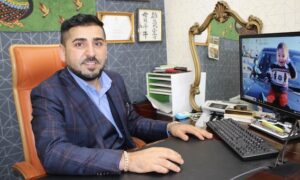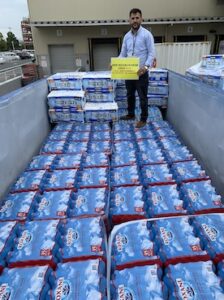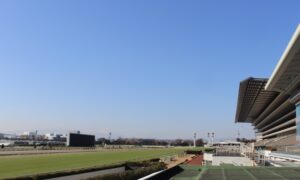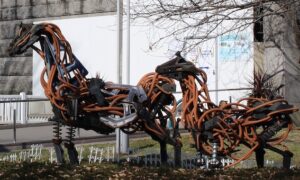A Kurdish man who loves Japan(Part 1)
松田 隆🇯🇵 @東京 Tokyo🇯🇵
最新記事 by 松田 隆🇯🇵 @東京 Tokyo🇯🇵 (全て見る)
- 真実語った宮田笙子選手”最高刑” 五輪辞退の無情 - 2024年7月19日
- 毎日新聞が富山から撤退 Xデー間近か - 2024年7月18日
- 朝日社説に歴史改竄級ミス トランプ氏銃撃で - 2024年7月16日
In the cities of Kawaguchi and Warabi in the southern part of Saitama Prefecture, it has become a hot topic, mainly on the Internet, that foreigners living there are causing trouble. Many Japanese people believe that Kurdish individuals are causing these issues. We interviewed Yugel Mahirjan (31), a Kurdish resident of Kawaguchi City. I will divide the interview into two parts.
◾️Turks and Kurds of Turkish nationality
In Kawaguchi City, there are currently issues caused by foreign residents, and Japanese residents are confused. Foreign residents are engaging in acts such as reckless driving in modified cars, not following garbage disposal rules, gathering in parks to eat and drink, and persistently approaching women on the street (commonly known as “pick-up” behavior).
Japanese residents believe that these actions are being carried out by Kurdish people. Therefore, this website conducted a direct interview with Mr. Mahirjan, who can be considered one of the leaders of the Kurdish community.
Mr. Mahirjan was born in 1991 in the village of Tekirnunchamrul, Chehitkamil, the capital city of Gaziantep province, Turkey. In 1994, his father came to Japan alone and worked in the demolition business. In February 2002, when Mr. Mahirjan was 11 years old, he joined his father in Japan and enrolled in a local elementary school. In August of the same year, he returned to Turkey after overstaying his visa.
He came back to Japan in September 2004 and started working at a machine factory in Warabi City at the age of 13. In April 2016, he established Mahiru Co., Ltd., a demolition company. However, he himself was detained, and in 2018, at the age of 27, he was granted provisional release—a system where detainees are temporarily released from custody under certain conditions. This situation continues until now, and as a general rule, he is unable to work during his provisional release. According to the company’s website, Mahiru Co., Ltd. is represented by a Japanese Brazilian (presumed to be his wife).
Mr. Mahirjan has been living in Kawaguchi City for nearly 20 years, excluding the time he returned to Japan temporarily. He has no problem speaking Japanese, and the interview was conducted over the phone on May 15th and face-to-face on May 16th, all in Japanese. Some of his words included expressions that were difficult to understand or inappropriate, so we have provided appropriate Japanese translations on this website. Firstly, Mr. Mahirjan argued that it is not the Kurds but the Turks (Türk Halkı, Türkler) who are causing problems in Kawaguchi City and other places.
—When did your father come to Japan?
Mahirjan (hereinafter referred to as Mahirjan): My father came to Japan in 1994. He was one of the first Kurds to come.
—Does that mean the recently arrived people of Turkish nationality are not Kurds but Turks?
Mahirjan: (almost) 100% Turkish. Recently, there was an election (Turkish presidential election on May 14th), and a list containing the district of birth, name, date of birth, and cellphone number of all Turkish voters in Japan was leaked online, and we obtained it. There were over 5,000 names on the list. We can determine if a Turkish surname is Kurdish or not. So we have confirmed that there are only about 1,500 Kurds on the list. Currently, there are about 5,000 Turkish nationals who have applied for refugee status to the Japanese government, and it is safe to assume that about 3,500 of them are Turkish.
—Turkey is currently accepting a large number of Syrian refugees. Are most of the Turkish people coming to Japan refugees from Syria?
Mahirjan: No, no. The Turks coming to Japan are not Syrian refugees but ordinary Turks. They came to Japan because they were facing financial difficulties in their home country. Turkish citizens can easily enter Japan as no visa is required for travel between Japan and Turkey.
◾️42 modified cars and their owners
Mahirjan believes that the newly arrived Turks are not enthusiastic about coexisting with Japanese society, which is causing various troubles. According to him, there has been an increase in the number of Turkish people coming to Japan since 2015. About 10 years ago, the Immigration Bureau changed its policy, allowing Turks to be issued six-month visas if they applied for refugee status within the validity period of their three-month visas. Those who were granted a visa could work during the validity period. After this policy change, a large number of Turks came to visit.
—I often hear that residents of Kawaguchi are confused and concerned about Kurdish youth driving recklessly in modified cars.
Mahirjan: I spoke with the owner of a car modification shop. The owner said only one of the 42 modified cars belonged to a Kurdish individual. I talked to the parents of the car’s owner and took the key to prevent it from being used. The remaining 41 modified cars belong to Turks with whom we are not associated, and these Turks have nothing to do with us Kurds who arrived 20 years ago. The people (Turks) currently living in Japan are living according to Turkish customs. Therefore, it is true that many Turkish young people lack common sense. Even if we remind the young Turkish people to follow the rules, it won’t work. Some of the young Turkish people who came to Japan even engage in drug use.
—Many Japanese people believe that Kurds do not follow local rules, but are the individuals who do not follow the rules actually Turkish?
Mahirjan: Many Japanese people think that Kurds are causing trouble, but that is not true. Turkish people who lack common sense and do not follow rules and manners are coming to Japan. They were used to going to clubs, driving cars, and drinking in their home country. In the past, Kurds who came to Japan were rural people who did not drive modified cars, did not drink alcohol, and were unfamiliar with city life. A Kurdish man who recently went to Turkey described the city as “hellish.” Everyone was honking their horns, and the noise was terrifying. Turks were born and raised in such places. So even if we remind them to follow the rules, they won’t. Some young Turkish people who came to Japan even use drugs.
◾️Volunteer after the Great East Japan Earthquake
According to Kawaguchi City’s “Second Kawaguchi City Multicultural Coexistence Guidelines Revised Edition,” there are 1,382 Turkish residents in the city (as of January 11, 2022). The document does not distinguish between Turks and Kurds. In fact, it is extremely difficult for us to differentiate between individuals of Turkish nationality who are Turkic or Kurdish. It is almost impossible for us to make such a distinction unless we study the region professionally at universities. Despite this, Mr. Mahirjan disagrees with the criticism by Japanese people that “Kurds do not follow local rules.”
Additionally, as he takes pride in contributing to the local community through volunteer activities, he finds it unbearable to be told by Japanese people that “Kurds do not follow local rules.” He started volunteering after the 2011 Great East Japan Earthquake. Since then, he has delivered relief supplies by truck to victims of various disasters, including the 2015 Kanto and Tohoku heavy rains, the 2016 Kumamoto earthquake, the 2019 Chikuma River disaster, and the heavy rain disaster in Chiba Prefecture.
—How long have you been volunteering in different regions?
Mahirjan: I volunteered in Kesennuma City for three weeks during the Great East Japan Earthquake and in Joso City in Ibaraki Prefecture for three days during the heavy rains in the Kanto and Tohoku regions. During the Kumamoto earthquake, I went to Mashiki Town in Kumamoto Prefecture. I went to Chikuma City in Nagano Prefecture during the flood and to Katori City in Chiba Prefecture during the heavy rain disaster. I brought various supplies with me to these areas.
—Why did you decide to start volunteering?
Mahirjan: I don’t know if I would have been as happy as I am now if I had stayed in Turkey. I am happy because I am in Japan, so I wanted to give back to Japan.
Mahirjan transports relief supplies with a large Japanese flag on his truck instead of the Turkish flag. It may be his way of expressing gratitude and giving back to Japan.
(Continued in Part 2)







